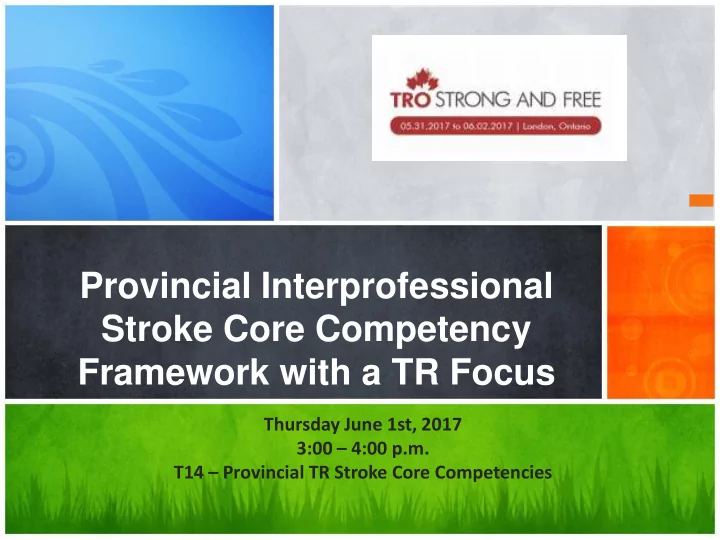

Provincial Interprofessional Stroke Core Competency Framework with a TR Focus Thursday June 1st, 2017 3:00 – 4:00 p.m. T14 – Provincial TR Stroke Core Competencies
Presenters Keli Cristofaro R/TRO Holly Graham R/TRO Stroke Community Recreation Therapist Engagement Specialist Huron Perth Community NWO Regional Stroke Stroke Rehabilitation Team Network
Session Outline The intent of the Stroke Competency framework is to provide health care professionals working in stroke with a clear and comprehensive way to independently achieve core competencies needed for evidence-based stroke care. Learning Objectives 1. To provide an understanding of the 16 Therapeutic Recreation core competencies. 2. To provide an overview of evidence based stroke care as it relates to Therapeutic Recreation. 3. To support Therapeutic Recreation professionals in accessing the framework and provide options for its usability.
Where it all began…in 2007 Key Stakeholders: • Heart and Stroke Foundation of Ontario • Central South Regional Stroke Network • Hamilton Health Sciences Project: • Developed and piloted a discipline-specific resource • Learning objectives across 16 areas • All related to stroke care • Therapeutic Recreation included
7 years later…
Where it all began again…2014 Presentation by Michelle Donald and Rebecca Fleck • Stroke Collaborative in October 2014 ‘ A Coordinated Approach towards a Provincial Stroke Competency Frame Work ’ . Disciplines identified to be participating in the project included: Nursing • Physiotherapy • Occupational Therapy • Speech-Language Pathology • Social Work •
Recreation Therapy The missing discipline to participate in the project….
Moving forward…with Therapeutic Recreation • Develop and test a resource outlining discipline specific learning objectives related to stroke care, building on the work that completed in 2007. • The SWO Recreation Therapy Stroke Network was called upon to form a working group to accomplish these objectives. • 8 members of this Network committed to reviewing the existing Framework and support the new template.
What did we accomplish? • Reviewed and identify core stroke competencies for Recreation Therapy • Identify resources/tools which could support achievement of each competency • Identify how achievement of each competency will be evaluated • Utilized KT experts to review the current competencies
Pilot Phase - September 2016 Identified Collected Hosted Pilot Sites feedback x 2 2 webinars The goal for the pilot was to provide the opportunity to review and explore the competencies in real time.
Timelines • Pilot completed Feb 2017 with 30 organizations across the province • Feedback informing revisions completed May 2017 • Final launch of framework including online templates, User’s Guide, and reference materials targeted for June 2017
Pilot Sites… • • Toronto Rehab Stratford General • • Pembroke Bridgepoint Health Hospital • Hamilton Health Regional Ottawa • Humber River • Sciences – HGH Timmins and Hospital, Civic Hospital District Area • Hamilton Health • Ottawa Hospital Hospital • Westpark Sciences – St. • Rehab Centre Peters St. John’s Rehab, • Royal Victoria Sunnybrook • Hotel Dieu • Bruyere Hospital Hospital Health Sciences Shaver • North York Centre • Lakeridge Health • Grand River • General Thunder Bay Corp Hospital Regional Health • • St. Michaels’ Brantford • Kingston General Science Center Hospital Hospital • Belleville General • Trillium Health • Rouge Valley Hospital Partners Health Centre • • Perth and Smith Brampton Civic • Toronto East Hospital Falls District • General Chatham Kent • VON, Kingston Health Care • Providence Health Alliance Centre
Support During the Pilot Local contact person: • for each pilot site to utilize for Q&As during the process FAQ document: • was updated weekly to support real life questions asked by current participants Pilot User Guide: • outlines the process and identify learning needs
Where to access this information? To view the Recreation Therapy competencies, t he online framework is available at the Ontario Stroke Network website at: http://ontariostrokenetwork.ca/core-competencies-for-stroke/
Where to access this information?
Core Competency Areas 1. Principles of Stroke Care 8. Instruments Activities of Daily Living 2. Anatomy and Physiology of Stroke 9. Cognitive, Perceptual and Behavioural Changes 3. Cardiovascular and Following Stroke Respiratory Effects 10. Sexuality 4. Psychosocial Effects 11. Nutrition 5. Communication 12. Dysphagia 6. Independence in Mobility and Prevention 13. Skin Care of Complications of 14. Continence Management Immobility 15. Primary and Secondary 7. Routine Activities of Stroke Managements Daily Living 16. Transitions Management
14.0 Continence Management Learning Objective: 14.1 Recognize the effect of stroke on bladder and bowel function and strategies for continence management during leisure engagement. Suggested Learning Resources: • Heart & Stroke Foundation: Taking Action for Optimal Community and Long Term Stroke Care (TACLS) Chapter 3 Body Functions (Physical) Section 3.4 Bowel and Bladder Control Pages 47-57 • SWO Stroke Rehab Unit Orientation Module 4: Continence Optional Learning Resources: • Canadian Stroke Best Practice Recommendations: Section 4.2.5 Continence • Heart & Stroke Foundation: Your Stroke Journey Chapter 4: Living with Physical Changes- Bladder and Bowel Pages 56-58 Suggested Evaluation Methods: Successful completion of SWO Stroke Rehab Unit Orientation Module 4 quiz.
Benefits of a Using the Core Competency Framework Professional • Learning gap analyses • Support self-directed learning • Professional development (individual or group learning opportunities) • Inclusion of stroke specific goals for performance appraisals • Form the foundation for learning plans for ongoing individual professional development • Guidance of annual education plans for Coordinators, Educators, Nurse Clinicians etc.
Benefits of a Using the Core Competency Framework Organizational • Training/orientation of staff in new or established stroke units • Support interprofessional education and collaborative practice through shared learning opportunities • Support accreditation processes i.e. Accreditation Canada’s Stroke Distinction • Stroke team quality initiatives
Moving Forward… Sustainability • Updating links within the templates (2 times per year) • Reviewing templates for removal of out of date resources and addition of new resources within the templates (once per year) • A coordinated effort to support local use of the framework
Where to learn more? More Information can be found by ? accessing : http://ontariostrokenetwork.ca/core- competencies-for-stroke/
Recommend
More recommend